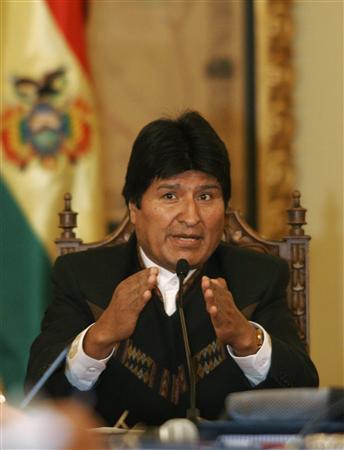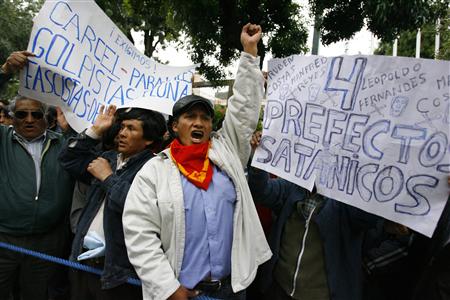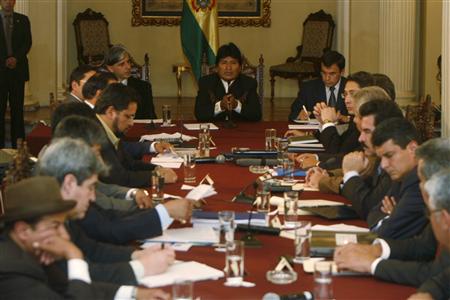Morales and foes say Bolivia should stay together
January 8, 2008 - Reuters
By Terry Wade
 LA PAZ, Bolivia (Reuters) - Bolivia's leftist President Evo Morales and opposition governors struggled to overcome their bitter differences at talks early on Tuesday but he said that South America's poorest nation should stay one country.
LA PAZ, Bolivia (Reuters) - Bolivia's leftist President Evo Morales and opposition governors struggled to overcome their bitter differences at talks early on Tuesday but he said that South America's poorest nation should stay one country.
(right) Bolivia's President Evo Morales speaks during a meeting with governors of all provinces at the presidential palace in La Paz January 7, 2008.REUTERS/David Mercado
Four of Bolivia's nine provinces have declared themselves autonomous to protect what they see as their share of natural gas revenues and protest a new version of the constitution adopted by Morales allies. The United States, the European Union and other Latin American countries have urged both sides to reach a compromise.
"The people want to see us stay together," Morales said, after seven hours of negotiations that started Monday night and spilled into Tuesday. "Let's work together to resolve our differences."
Morales, the country's first indigenous president, said he and the governors would set up a committee to forge a national unity pact and settle conflicts over the spoils from natural gas exports, demands for autonomy, and the new constitution.
Rivals have accused Morales, a close ally of Venezuela's fiery leftist president Hugo Chavez, of seeking to make an illegal power grab.
Critics say a draft version of the new constitution was forced through by Morales allies in a constitutional assembly late last year without the presence of opposition delegates
 (right) Supporters of Bolivia's President Evo Morales protest near the presidential palace during Morales' meeting with governors of all provinces in La Paz January 7, 2008. REUTERS/David Mercado
(right) Supporters of Bolivia's President Evo Morales protest near the presidential palace during Morales' meeting with governors of all provinces in La Paz January 7, 2008. REUTERS/David Mercado
Several people died in heated protests against the way the constitutional assembly conducted the debate.
Leopoldo Fernandez, the governor of Pando province, which has declared autonomy, told Morales he must revise the draft constitution to include more input from the opposition if he hopes to ensure democratic stability.
"You won't be able to govern if only a small majority of 51 of the people approve your constitution, and 48 percent of them oppose it," Fernandez said. "We can't treat these issues superficially."
The draft of the new constitution is slated to be voted on in a nationwide referendum sometime this year.
 (right) Bolivia's President Evo Morales (C), Vice President Alvaro Garcia Linera (L) and Government Minister Juan Ramon Quintana (R) meet with governors of all provinces at the presidential palace in La Paz January 7, 2008. REUTERS/Jose Luis Quintana
(right) Bolivia's President Evo Morales (C), Vice President Alvaro Garcia Linera (L) and Government Minister Juan Ramon Quintana (R) meet with governors of all provinces at the presidential palace in La Paz January 7, 2008. REUTERS/Jose Luis Quintana
Referendums on Morales and the governors that would keep them in office or force them out are also expected to be held.
Morales, an Aymara Indian whose support base is in the Andean highlands of western Bolivia, wants to give indigenous communities more political power and enact a land reform program.
Opposition governors from the east, which is rich in hydrocarbons, want to make sure Morales does not cut their share of growing revenues from natural gas exports. He has threatened to curb transfers to provinces to fund social programs instead.
The opposition leaders also fear land reform could whittle away the size of lucrative soy farms in the eastern lowlands.
"We all want peace and unity but in a dialogue there are some things that you cannot negotiate, which are principles and laws," said Ruben Costas, the governor of wealthy Santa Cruz province, who has led the regional autonomy drive.
(Additional reporting by Sergio Burgoa; Editing by Philip Barbara)